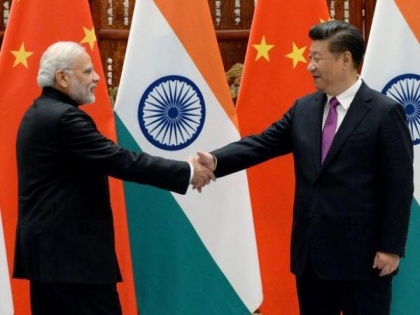Experts say Modi-Xi informal summit likely to provide stability to bilateral ties
By ANI | Published: October 10, 2019 10:37 PM2019-10-10T22:37:40+5:302019-10-10T23:00:03+5:30
The second informal summit between Prime Minister Narendra Modi and visiting Chinese President Xi Jinping at Mamallapuram in Tamil Nadu from October 11 is a positive development and is expected to provide stability and predictability to the bilateral ties, experts have said while also noting that China may not change its stance on issues such as NSG membership.

Experts say Modi-Xi informal summit likely to provide stability to bilateral ties
The second informal summit between Prime Minister Narendra Modi and visiting Chinese President Xi Jinping at Mamallapuram in Tamil Nadu from October 11 is a positive development and is expected to provide stability and predictability to the bilateral ties, experts have said while also noting that China may not change its stance on issues such as NSG membership.
Xi Jinping will arrive in Chennai for the two-day informal summit on Friday.
Swaran Singh, a Professor who teaches international relations at Jawaharlal Nehru University, said the outcomes of brainstorming would be seen in the next few months even as "friendship between the two leaders" will be on full display.
"Both India and China are rapidly changing large societies. These two leaders do not have only responsibility in the bilateral sense. They today see themselves leading in several regional and global issues. The informal summit is not supposed to be agenda-driven. The idea is to build confidence, trust and brainstorm ideas, the outcomes of which we will be seen in the coming months," he told .
Recalling the first informal summit which took place in China's Wuhan in April last year, Singh said, "You will see the optics, camaraderie and friendship on Friday evening. But the brainstorming that happens on Saturday will be known several months later as to what was achieved in the meeting."
NN Jha, who served as India's ambassador to Ireland, Turkey, Sri Lanka and some other countries, called the upcoming informal summit a "good idea" but expressed some scepticism about the outcome of the meeting.
He called Pakistan a "vassal state" of China and was pessimistic about Beijing supporting India's membership of Nuclear Supplier Group (NSG).
"The meeting is a very good idea. But I don't know to what extent it will be useful at the end. They (China) give one set of assurances and then they change. I don't know if they will make a change in their close ties with Pakistan and change what they said on Kashmir earlier," Jha told .
"I also doubt if they are willing to support (India) in NSG. They have suddenly opened their mouth on Ladakh. Pakistan is a vassal state of China and no power would like to give up a vassal state," he said.
Ashok Sajjanhar, a former ambassador of India to Kazakhstan, Sweden and Latvia, said the informal summit between Modi and Xi is a very positive development and expressed hope that the understanding reached between them will provide stability to bilateral ties.
"It's a good move and a very positive development. The first informal summit took place in Wuhan. That time relations between the two countries were not very friendly and cordial. This was the aftermath of 73-day standoff at Doklam," he said.
"Again what we find is the relations between two countries are little tense and stressed because of the support China has provided to Pakistan on the Kashmir -- first by raising it in the UNSC informal meeting and secondly through statements at the UNGA. It's an opportune time that two leaders are meeting and I do hope that the understanding reached between them will provide some stability and predictability to the bilateral ties," Sajjanhar stressed.
Talking about China's stand on the Kashmir issue, the former diplomat said that there are conflicting signals coming from Beijing in the matter.
"We have to wait for President Xi to come here and see what he has to say. There are confusing and conflicting signals that are coming from the Chinese side. If they do revise their stand, it's very good. But we will need to wait to get confirmation from President Xi himself," said Sajjanhar.
The upcoming informal summit will provide an opportunity to the two leaders to continue their discussions on overarching issues of bilateral, regional and global importance and to exchange views on deepening India-China Closer Development Partnership, the Ministry of External Affairs had said in a statement.
The informal meet comes two months after India abrogated Article 370 that granted special status to Jammu and Kashmir and bifurcated the state into two Union Territories (UTs) in August.
Pakistan's attempts to internationalise the matter has not found the support of the international community.
( With inputs from ANI )
Open in app